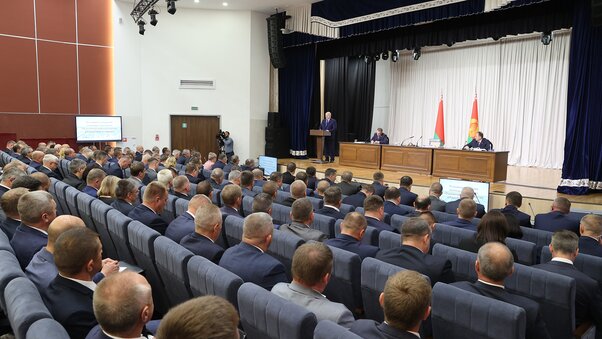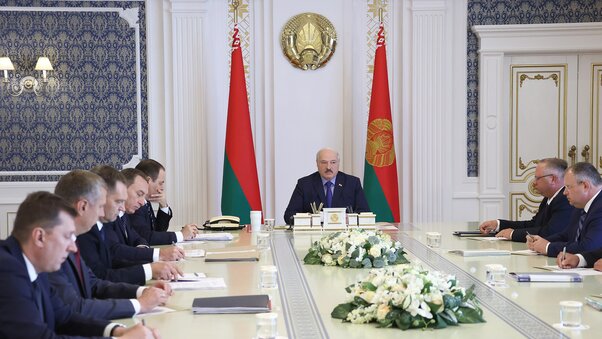Meeting to discuss export of Belarusian goods
- 10
- 7:07
Belarusian President Aleksandr Lukashenko hosted a government meeting on 3 October to discuss the export of Belarusian goods.
Generally speaking, the topic of the conversation is the sale of Belarusian goods in the domestic and foreign markets, as well as related problems (if any), like payments and the budget. “Let’s zoom in and have a look at these matters on the example of potash fertilizers and related issues (logistics, ports, which we have discussed more than once), and on the example of petroleum products and their logistics, deliveries and payments,” the Belarusian head of state said.
The President recalled a meeting that was held about two months ago. Taking part in that meeting were almost the same officials as are present today. That meeting discussed the creation by Belarus of its own port capacities to transship its cargo, primarily potash fertilizers, as well as export plans for the remaining part of the year. According to Aleksandr Lukashenko, today’s meeting will take stock of the efforts to fulfill these tasks.
“The necessary decisions have been made, appropriate instructions have been given. Naturally, despite all kinds of external challenges, we keep working in foreign markets, we feel quite confident there, as Belaruskali chief Ivan Ivanovich Golovaty told me last week,” said Aleksandr Lukashenko. “We should keep the pace. There are too many obstacles and barriers that we have to overcome,” he added.
The President named shipping by rail one of bottlenecks of export deliveries.
“Naturally, we withdrew from the Baltic ports. We use port infrastructure located near St. Petersburg, we look further north, i.e. at Murmansk ports (that can handle millions, millions of tonnes of cargo that we must deliver). We also use ports in the south of the Russian Federation. No one prevents us from working at these ports. But I emphasize once again: the bottleneck is delivery by rail, especially delivery towards St. Petersburg,” Aleksandr Lukashenko noted.
In this regard, the President mentioned his recent conversation with Russian President Vladimir Putin, during which the possibility of implementing two major projects was discussed, one of which concerns the railway line from Belarus to St. Petersburg.
“We discussed this bottleneck - railway transport,” said the Belarusian leader. “I asked Deputy Prime Minister Sivak and the prime minister [Deputy Prime Minister Anatoly Sivak and Prime Minister Roman Golovchenko] to prepare, let’s say, presentation materials on all the bottlenecks related to cargo transportation by rail in the direction of St. Petersburg. These materials should be ready by my meeting with the President of Russia that will take place in the near future,” Aleksandr Lukashenko added.
According to the head of state, one of the options is to implement a large-scale project and build a second line as long as several hundred kilometers. “Another option is to restore Soviet-time passing loops. By restoring passing loops, we will significantly increase the shipments of our products in the coming years,” the Belarusian leader explained.
According to him, Vladimir Putin upheld this idea. “He said: I haven’t delved deeply into this issue, let’s discuss it at a meeting.” We are scheduling this meeting [it is to take place during the CIS summit in Bishkek in mid-October], we will discuss railway supplies,” said Aleksandr Lukashenko. He added that the agenda of the meeting will also include the use of port infrastructure.
The President addressed a number of important questions to those in attendance: how is the situation developing primarily in the market of potash fertilizers and petroleum products? The head of state demanded that special attention be paid to accounts receivable for mineral fertilizers.
During the meeting, Aleksandr Lukashenko also touched upon issues related to foodstuffs. The head of state has been closely following this issue recently. The President has made appropriate decisions and given instructions in a number of areas. “All decisions have been taken – you just need to get down to work. This work needs to be arranged by the government,” the head of state demanded.


